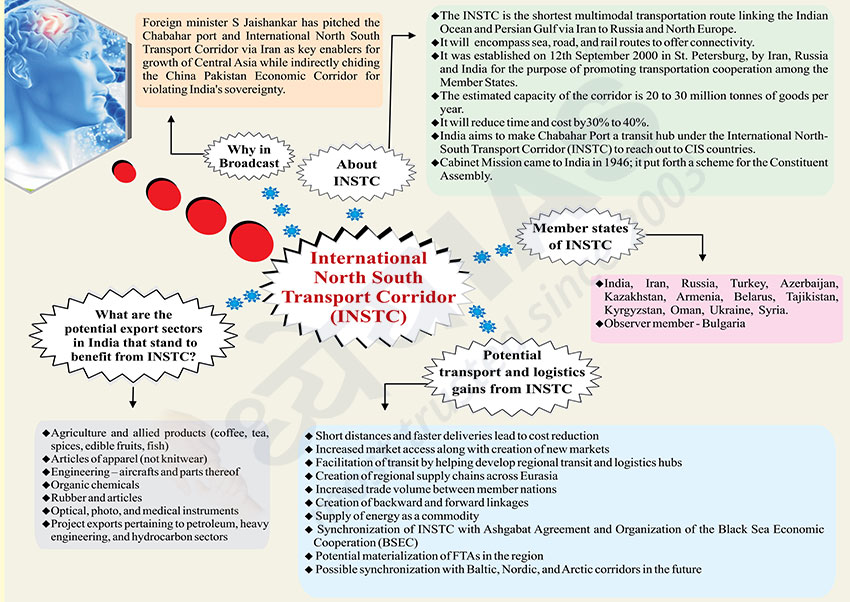Brain-booster /
30 Nov 2022
Brain Booster for UPSC & State PCS Examination (Topic: International North South Transport Corridor - INSTC)

Why in Broadcast?
- Foreign minister S Jaishankar has pitched the Chabahar port and
International North South Transport Corridor via Iran as key enablers for
growth of Central Asia while indirectly chiding the China Pakistan Economic
Corridor for violating India's sovereignty.
About INSTC
- The INSTC is the shortest multimodal transportation route linking the
Indian Ocean and Persian Gulf via Iran to Russia and North Europe.
- It will encompass sea, road, and rail routes to offer connectivity.
- It was established on 12th September 2000 in St. Petersburg, by Iran,
Russia and India for the purpose of promoting transportation cooperation
among the Member States.
- The estimated capacity of the corridor is 20 to 30 million tonnes of
goods per year.
- It will reduce time and cost by30% to 40%.
- India aims to make Chabahar Port a transit hub under the International
North-South Transport Corridor (INSTC) to reach out to CIS countries.
- Cabinet Mission came to India in 1946; it put forth a scheme for the
Constituent Assembly.
Member states of INSTC
- India, Iran, Russia, Turkey, Azerbaijan, Kazakhstan, Armenia, Belarus,
Tajikistan, Kyrgyzstan, Oman, Ukraine, Syria.
- Observer member - Bulgaria
Potential transport and logistics gains from INSTC
- Short distances and faster deliveries lead to cost reduction
- Increased market access along with creation of new markets
- Facilitation of transit by helping develop regional transit and
logistics hubs
- Creation of regional supply chains across Eurasia
- Increased trade volume between member nations
- Creation of backward and forward linkages
- Supply of energy as a commodity
- Synchronization of INSTC with Ashgabat Agreement and Organization of the
Black Sea Economic Cooperation (BSEC)
- Potential materialization of FTAs in the region
- Possible synchronization with Baltic, Nordic, and Arctic corridors in
the future
What are the potential export sectors in India that stand to
benefit from INSTC?
- Agriculture and allied products (coffee, tea, spices, edible fruits,
fish)
- Articles of apparel (not knitwear)
- Engineering – aircrafts and parts thereof
- Organic chemicals
- Rubber and articles
- Optical, photo, and medical instruments
- Project exports pertaining to petroleum, heavy engineering, and
hydrocarbon sectors








